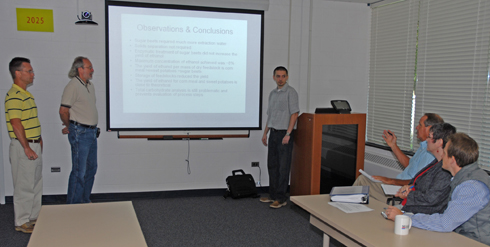VGCC team studies Sweet Potatoes, Sugar Beets as Alternative Fuel sources

Students in the Bioprocess Technology program at Vance-Granville Community College recently completed a months-long research project sponsored by the Oxford-based Biofuels Center of North Carolina. They presented the final results of their experiments to officials at the Biofuels Center on July 2.
A team of three students — Sergiy Ger of Franklinton, Rick Gray of Henderson and Vicki May of Oxford — and instructor Joe Tyler, who heads the two-year Bioprocess Technology program, have been working since January to determine if industrial sweet potatoes and tropical sugar beets grown at the Biofuels Center could feasibly be used as feedstocks to produce bio-ethanol, an alternative liquid fuel. The research has far-reaching practical implications for North Carolina farmers. The VGCC team used enzymes produced by Novozymes, which has a facility in nearby Franklinton, to make ethanol from sweet potatoes, sugar beets and corn meal, which was purchased from a local grocery store to use as a control sample.
On July 2, Ger took the lead in explaining to Biofuels Center director of farming Sam Brake and director of contracts and grants HollyAnn Rogers how the students processed and analyzed the natural materials. They found that while corn meal gave the best total yield of ethanol, sweet potatoes could be converted to ethanol with a yield of 85-90 % compared to corn. The yield of ethanol from sugar beets was about 75 % of the yield from corn meal. They also found that different methods of storing the harvested crops had an effect on how much fuel was produced. “I’m encouraged by the results showing that sweet potatoes are a viable feedstock for bio-ethanol,” Tyler said. The Biofuels Center staff thanked the students and Tyler for their work and talked about the possible applications for North Carolina sweet potatoes. Tyler discussed plans for his students to work with the Biofuels Center again on different projects in the future. As part of the degree program, students are required to complete a cooperative work experience related to the field of bioprocessing. “It’s been a great learning experience, and that’s what it’s all about,” said Ger. All three VGCC students graduated from the college in May with Associate in Applied Science degrees in Bioprocess Technology, and Ger is continuing his education in pharmaceutical sciences at North Carolina Central University’s BRITE Center this fall.
The Biofuels Center of North Carolina , funded with a $5 million initial appropriation from the 2007 General Assembly, is a private, nonprofit corporation headquartered on the 426-acre North Carolina Biofuels Campus in Oxford. The long-term task of the Biofuels Center is to develop a statewide biofuels industry to reduce the state’s dependence on imported liquid fuels.
VGCC’s Bioprocess Technology curriculum is designed to prepare individuals to work as process technicians in biological products manufacturing facilities. For more information on the Bioprocess Technology program, call Joe Tyler at (252) 738-3350.
Above: From left, recent VGCC Bioprocess Technology graduate Rick Gray, Bioprocess Technology program head Joe Tyler and recent graduate Sergiy Ger present the findings of their study of sweet potatoes and sugar beets to (seated) Biofuels Center director of farming Sam Brake, director of contracts and grants HollyAnn Rogers and communications manager Shane Reese. Vicki May, another recent VGCC graduate not pictured, also participated in the research. (VGCC photo)

